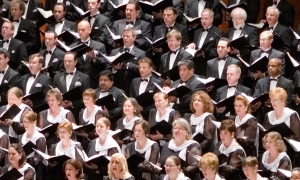
December 13, 2010
Taking the Chorus out for a spin
Ahead of the orchestra’s performances of Handel’s Messiah in Candlelight this weekend, we invited members of the Houston Symphony Chorus (who, by the way, just celebrated their 1000th performance!), to write about their experience preparing for such a huge piece. Our first entry comes from Susan Scarrow, the manager of the Houston Symphony Chorus. In her “day job” she is a Professor of Political Science at the University of Houston.
Tuesday evening is the piano rehearsal for this year’s Messiah performance and I am really looking forward to it. Piano rehearsals are my favorite part of the whole rehearsal process. The term “piano rehearsal” is a bit misleading, because of course all of our regular rehearsals have piano accompaniment – in our case, this is generally provided by the amazingly talented Scott Holshouser, the Houston Symphony’s principal keyboard. Scott’s artistry is a crucial part of our preparations for any piece. He doesn’t just play the notes, though he does that extremely well. More importantly, and much more rarely, Scott somehow “orchestrates” his playing so that we become familiar with the instrumentation long before we start rehearsing with the Symphony. But I digress.
 A piano rehearsal is the final Chorus rehearsal before the chorus and orchestra rehearse together, and it is the first chance for the week’s conductor to run through the piece with the Chorus. For concerts with visiting conductors (Matthew Halls is conducting this week’s Messiah performance), the whole evening is a lot like a mutual test drive of a new car. The conductor will take the Chorus out for a spin, seeing how fast we can sing the many tricky melismas, hearing how softly we can sign those pianissimos, maybe sprinkling in a few new vocal ornaments to see how they sound. At the same time, we singers will get to know the maestro’s conducting patterns, figuring out how he is going to start pieces, learning his tempos. In a piano rehearsal for Messiah, a piece we all know well, we also usually learn something about a conductor’s performance practice approach, and even about his or her theology.
A piano rehearsal is the final Chorus rehearsal before the chorus and orchestra rehearse together, and it is the first chance for the week’s conductor to run through the piece with the Chorus. For concerts with visiting conductors (Matthew Halls is conducting this week’s Messiah performance), the whole evening is a lot like a mutual test drive of a new car. The conductor will take the Chorus out for a spin, seeing how fast we can sing the many tricky melismas, hearing how softly we can sign those pianissimos, maybe sprinkling in a few new vocal ornaments to see how they sound. At the same time, we singers will get to know the maestro’s conducting patterns, figuring out how he is going to start pieces, learning his tempos. In a piano rehearsal for Messiah, a piece we all know well, we also usually learn something about a conductor’s performance practice approach, and even about his or her theology.
For instance, what IS the most important word in the phrase “For unto us a child is born?” Is it “us”, “child”, or “born”? And are the pick-up notes in “Behold the Lamb of God” sixteenth notes or eighth notes? If you listen closely to our performances, you will hear that each year’s conductor has a different set of answers to these and other seemingly minor questions, and their answers are often grounded in strong and thoughtful convictions. At the piano rehearsals, conductors will take the time to explain some of the convictions behind the musical details they are asking for, sometimes giving these rehearsals an element of being master-classes with world-class musicians. The mutual insights we gain at Tuesday’s rehearsal will guide us through the week, forming the basis for the understanding and trust that is an essential part of the wordless communication that you witness in any good performance.
Susan Scarrow, Soprano II






